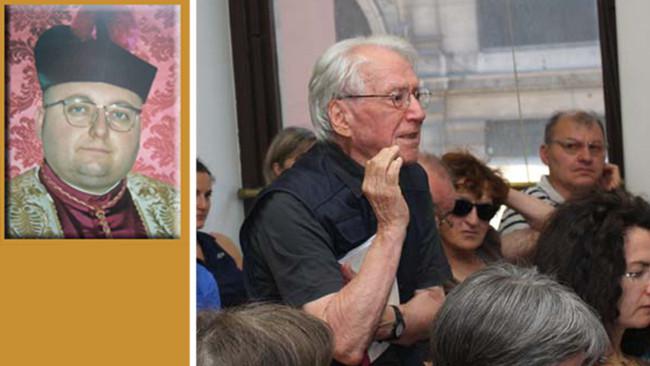|
Italian prosecutors allege Monsignor Giuseppe Rocco was killed after he exposed a thieving priest
By Jamie Seidel
A MONSIGNOR. A murder. A missing treasure. It’s a mysterious crime that has gripped Italy. But now the story of April 25, 2014, is about to be told. It was 7.30am. Housekeeper Eleanora Dibitonto knocked on the door to Monsignor Giuseppe Rocco’s small, Spartan room, in a manse in Trieste. It was her job to make sure the frail 92-year-old would wake in time for morning mass. This morning, there was no response. So Eleanora opened the door. She saw Rocco lying, fully dressed, on his back on the floor. He was dead. First she called an ambulance. Then she called another priest. Father Paolo Piccoli, 52, gave Rocco his last rites. But when the ambulance officers arrived, they noticed something odd. The dead clergyman had a broken bone sticking out of his neck. Then two spots of blood were seen under his body. They called police, suspecting foul-play. When the news hit the local Italian media, conspiracy theories leapt to the fore. MAN OF MANY COLOURS In the weeks before his murder, Monsignor Rocco had reported the theft of a set of religiously significant statuettes from his cell. Then the Madonna, horse and ship figurines suddenly reappeared. But Rocco was annoyed. He suspected housemate Father Piccoli — once accused of stealing precious relics from a previous parish — was back in the game. Prosecutors say they have a copy of a letter sent by church authorities to Father Piccoli, warning of disciplinary action over the alleged theft. Such a charge could have ended the younger priest’s career. Local media reports Piccoli was an odd character. Court documents reveal he ran up huge debts on his father’s account in order to dressed up in authentic priestly vestments as a youth. It was the first sign of an alleged ‘fetish’ for sacred objects that later saw him accused of stealing from one of his parishes. An internal church investigation resulted in those objects being returned, but no civil action was taken. Nor was Piccoli entirely popular as a priest. Several complaints had reportedly been made about his aggressive and intimidating attitude towards altar boys. Some of his former parishioners also described him as paranoid — convinced the ‘communists’ were determined to run him out of town. A BLOODY BUSINESS The Italian police’s first breakthrough came with the linking of the two spots of blood under Father Ricco’s body with Father Piccoli. Piccoli, when interrogated, insisted he had a condition that weakened his skin and often caused open sores. The blood on Monsignor Rocco must have got there while administering last rights, Piccoli said. Father Piccoli also insisted there were other people in the Trieste manse the night of the murder. “People were coming and going all the time in that house,” he told police. “We were never alone. There was a centre for volunteers, a journalist, and a professor who often stayed at the house.” But prosecutors say his story does not add up. They have now had aggravated murder charges served against Father Piccoli. JUDGEMENT DAY “It is with deep sorrow that I have learned the news that Don Paolo Piccoli, a priest in the Presbytery of this Archdiocese … is being investigated by the judiciary on charges of murder against a senior priest of Trieste,” an open letter from the region’s archbishop reads. Prosecutors cite what they say are several key holes in the priest’s story. First court documents state the dead priest had not been moved during the ceremony. And the blood was found under his corpse. Second, the housekeeper — Eleanora Dibitonto — has given testimony that only the three of them were in the manse that night. Court documents allege Father Piccoli had woken earlier in the morning to confront Monsignor Rocco about the accusation of theft. The two argued, prosecutors say, with Piccoli strangling Monsignor Rocco. A court will decide on December 13 if the case has merit.
|
.
Any original material on these pages is copyright © BishopAccountability.org 2004. Reproduce freely with attribution.
